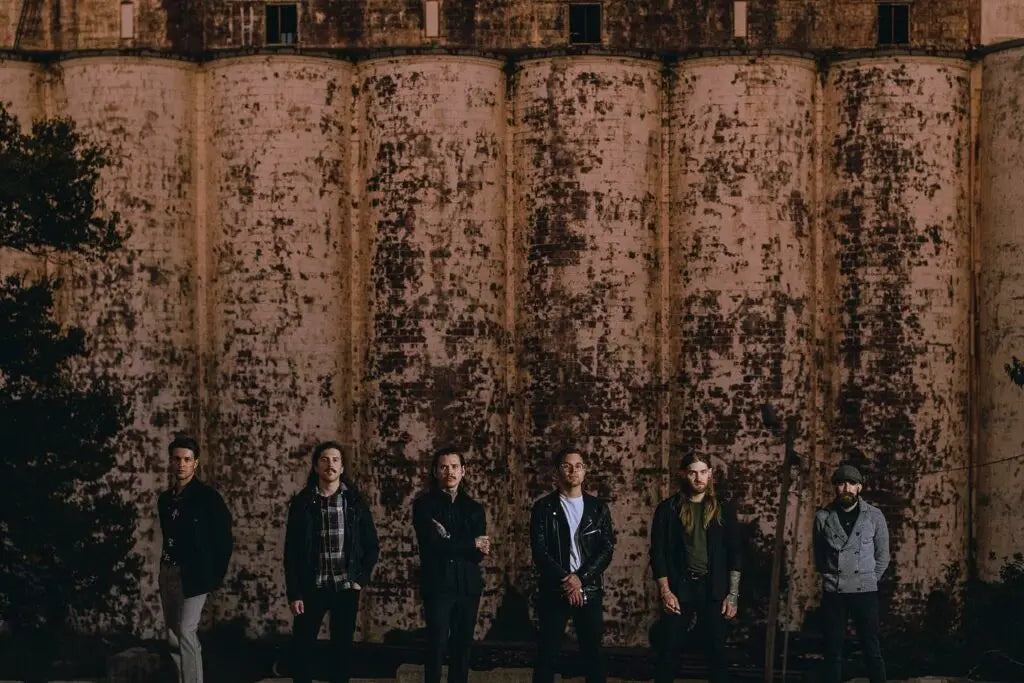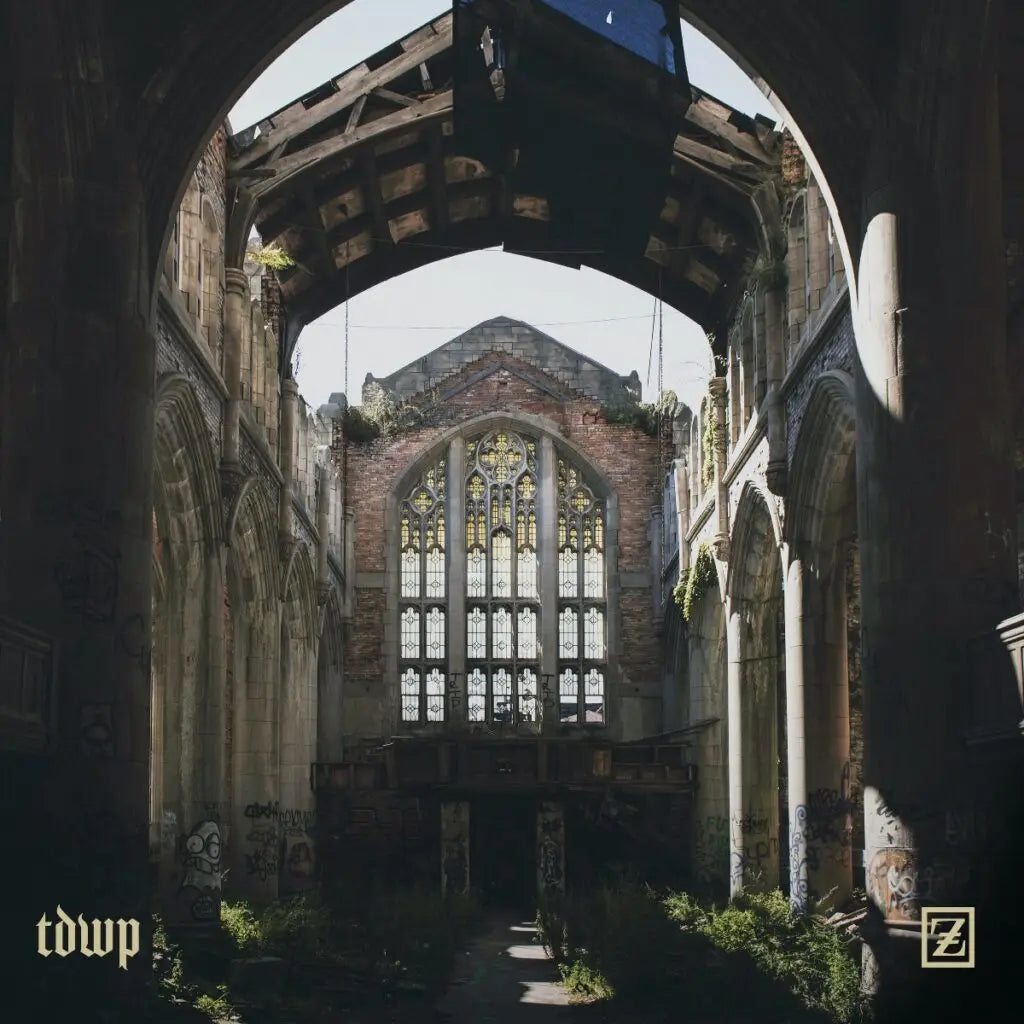A day in the life of published author, club hockey player, and The Devil Wears Prada vocalist Mike Hranica is one surprisingly defined by “dad tasks.” Despite his fatherhood being limited to two beloved pups, he expresses the joy in simple pleasures such as woodworking and houseplant keeping. “With the pandemic, I was able to get my lawn really nice,” the 32-year-old adds with excited confidence. While TDWP was once anchored in Chicago, the six-piece has dispersed throughout the United States, with Hranica landing about one hour away in Milwaukee, WI. “I get to dictate my pace rather than have the city dictate my pace,” he says of his life in the American dairy capital. “I’m an adopted Sconny.”
For those of us who grew up alongside TDWP, this sense of comfort and stability is a feeling with which we have become increasingly familiar as we grow older. Yet, we would not be where we are today if it wasn’t for the unruly fountain of emotions that defined our teenage years. The same could be said of TDWP, with Hranica and his bandmates ranging from only 16-18 years of age during the band’s inception. “In hindsight, I think kids
“For me, it was a means to exercise writing,” Hranica says of his gravitation towards vocals, which foreshadowed his more recent move towards authorship. After class, he recalls hurrying home to work on the lyrics for TDWP’s seminal record Plagues (2007), stating, “it was just such a wonderful release for me and finding a way to express my thoughts in a healthy positive being music.” While TDWP always prioritized making music, they did act on modest goals, such as playing shows outside of their hometown of Dayton, Ohio, where the scene was otherwise quite insular. Whether it was breaking out to Pittsburgh or Indianapolis, these shows were a glimpse of what their life was quickly going to become. “It was hard for the older members of the band because they wanted to start touring when Chris
While his classmates prepared to go off to college or start working, Hranica was stepping into a different kind of career. “My parents have always been wonderfully supportive...but my old man’s an engineer and it was a hard pill for him to swallow as far as ‘my kid’s getting in a band and just yelling around the country for the foreseeable future,’” he says. Fortunately for the Hranica household, it did not take long for TDWP to become a ubiquitous name within the heavy music community. On a whim, their music was submitted to Rise Records, who were immediately impressed with what they heard. The unit would go on to drop seven studio albums, three EPs, and a live record through Rise, Ferret, Roadrunner, and Solid State, including cult favorite Zombie (2010).
After a year of pestilence and plague, there is no more fitting time than a reboot of TDWP’s ode to the undead. In between his adventures in weedwacking, Hranica spent quarantine with his head down as TDWP quietly recorded five new tracks, which would come to be known as ZII. “We realized we wanted to write a few more

Back when you were just kids in Ohio, what goals did you have for The Devil Wears Prada?
None. For me, I thought it would be exciting to basically play the shows I was going to anyway and be able to express myself. There was never any notion of professionalism in terms of ‘here are the goals, here’s what success looks like.’ It’s kind of a tricky thing. I would advise bands not to go in and look at it as a business strategy or a business plan, but at the same time there needs to be some sort of backbone and some sort of drive, even if it’s as simple as ‘music first, always.’ I often see when bands are trying to strive to hit goals or to maintain or achieve objectives, music is always so secondary or so in the background. Even just having that be a firm backbone can be really important. That was definitely something for us. We were young kids and we were definitely gimmicky here and there, but as teenagers, music was always first for us instead of the trendy bullshit. I would be remiss not to admit that we definitely covered ‘Still Fly’ and such, but still, music first. Very much so.
What about that era of music made it so hospitable to Christianity, or more positive messages in general?
It’s weird because honesty all of the shows I was going to in Dayton, Ohio as I’m coming into myself from 13-15, I don’t know if I was totally pigeonholed, but I remember all of the metal and hardcore fans coming from a place of faith. For me, that was just really encouraging. It’s like the door was already open for me to be vocal about my faith and trying to spread the message that I believed in. In the bigger world, the bands on the Solid State roster and As I Lay Dying, they opened that door as well. Sharing the message that I had received firsthand from those bands, I wanted to share that too. I feel like our world, when people have ever asked about our faith and starting as a Christian band, I have always been pretty vocal about the fact that it was always harder on the Christian side than the metal side. Like, the metal community was always more welcoming to us than the church community. I know a big part of that is bands before us doing it, but I also think it’s reflective of the independent nature of the subgenre world in which we exist.
The name The Devil Wears Prada is a reference to some of the anti-vanity themes you used to talk about. Is that something that’s still important to you? What does the name mean to you today?
I was always really infatuated with the anti-material themes of Norma Jean and The Chariot. I really clinged onto that as far as being able to identify people who gauge life on material values. So I clung to that and thought that was where the name came from, but the other guys just thought it was clever. Then I read the book
Politics, I just didn’t put myself into that world at all. I grew up in a conservative household and I’m very, very not conservative. I don’t know if it was just me accepting the values of my family and not being able to stomach them or just being ignorant to politics and to class wealth until I had more of a head on my shoulders and a better understanding of not just the United States but the globe and the planet. I wouldn’t say that I see my values towards anti-materialism as childish or of being no value or being worthless, but I think I’ve pivoted to see what I consider to be a more mature perspective on the subject. Now, I would probably not name the band that.
While it was fun for kids like us, it also worked against us in the era of Sounds of the Underground and Ozzfest and metal being taken very seriously. These noodly bands that are more screamy and less all-consuming death and heavy weren’t accepted so much into that world. We did get our fair share of heckling when we came out of high school and we were supporting Gwar and Shadows Fall. We were the kids in yellow tshirts shaking our hips and whatnot, but still playing breakdowns. That’s where The Devil Wears Prada bit us in the ass, as well as now being 32-35-year-olds and being in situations where people ask the name of your band. A lot of the time we’ll say ‘TDWP’ or we’ll say ‘Kiss’ or ‘Iron Maiden’ or something, just be total assholes. It’s contextual.
Moving along to Zombie, were you guys expecting that kind of overwhelming response, especially from an EP?
No, I mean we put out three records really fast. The band started touring full time in 2007. With Roots Above And Branches Below came out in 2009. Three records in a matter of three-four years was kind of a lot. We were overseas and we were in Glasgow, Scotland and we had seen Zombieland as a band on an off day and we all thought it was really cool. Some creative part of me was like oh, write songs about zombies. Within a couple of days, Chris demoed out a few songs on the computer and I added vocals to it. We put in a lot of intentionality to not make it super hokey, but something that had a little bit more backbone than most obvious zombie cliches. But really, we were able to cook it up naturally. There’s a lot of good that can come from releasing EPs as far as consuming something that’s a little bit shorter, especially when we’re in such an ADD world where it’s like shiny thing, shiny thing, shiny thing, and everyone is trying to strive for your attention or your wallet or your time. It’s this life where more content is better. In that, I think an EP can work well.
Now, 11 years after Zombie coming out, I don’t think we were generous marketers by any stretch. I think those are some of the pros that assisted Zombie to do what Zombie did, and even charting metalcore songs is something I look back on favorably, hopefully not in arrogance. Obviously it's been quite a while now
How did you all make writing remotely work?
We’ve gotten adjusted to writing via laptop and writing songs back and forth and editing. With ZII specifically, our primary song writers are Jon
ZII is definitely a heavy record: very few clean vocals, very abrasive, and very much a metal album. Is that reflective of the state of the world it was written in, or is that more of the path that you’re generally moving towards?
We were all really excited with The Act (2019), which, in a non-pandemic world, we would be out touring in support of right now. It’s not a heavy record. Moments are heavy, but no part of it is meant to be ‘hey, we’re the heaviest band in the world.’ With that, a lot of people would whine and complain, like oh, make it heavy or whatever. We like doing what we like to do in terms of expressing ourselves and writing how we feel, which is a lot of what happened on The Act. I wouldn’t say ZII is the heaviest thing anyone has ever listened to, but it is on that spectrum in terms of how we perceive metalcore. We wanted to take it to that level and challenge ourselves. I don’t think it’s indicative of the future or a statement being the heaviest, best thing in metalcore. I think it’s a fictitious number of songs about a zombie apocalypse. I think there’s something quite liberating about not tugging on heartstrings, but creating something that stands as a fictitious place to the consumer and the artist. I guess that’s the length of my backstory to writing songs where it’s short, it’s not anything epic. I think it’s a hit you in the head experience and you don’t think about it. We’re really excited about this. Usually when you make music you release it in a more timely manner than ZII, but there’s a pandemic and we took our time with it. Now we’re nearing the finish line of people hearing the five songs.
‘ZII’ drops May 21 via Solid State Records. Pre-order the release - HERE

"Nightfall"
"Forlorn"
"Termination"
"Nora"
"Contagion"




